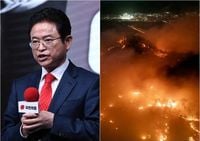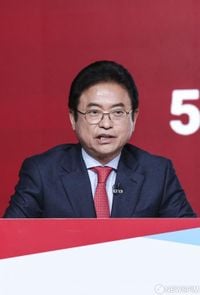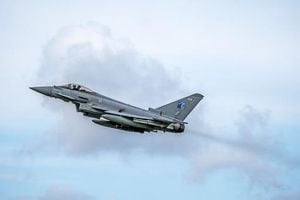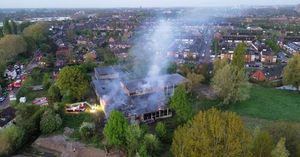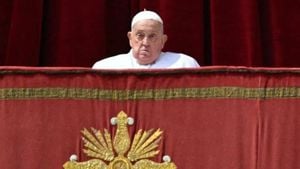On April 20, 2025, the political landscape in South Korea was charged with intensity as the People Power Party (PPP) held its primary debate in Gangseo-gu, Seoul. The event featured candidates Na Kyung-won, Lee Cheol-woo, Han Dong-hoon, and Hong Joon-pyo, all vying for the party's nomination for the upcoming presidential election. This debate not only highlighted their individual platforms but also set the stage for fierce exchanges regarding national security, impeachment, and the future direction of the party.
During the debate, Han Dong-hoon, a prominent candidate, asserted that "non-escalation is illegal," referencing the controversial events surrounding the national emergency declaration in December 2023. He emphasized that the actions of the previous administration, which he claimed were a significant overreach, should not be glossed over as mere mistakes. "Our party has produced a president who recognized the illegality of the emergency declaration and took a stand against it," he stated, suggesting that any leniency towards past actions would amount to tacit support for such measures.
Hong Joon-pyo, another candidate, countered Han's assertions by downplaying the impact of the emergency declaration, calling it "not practically harmful" and describing the situation as a "2-hour happening." He expressed his belief that while he opposed the emergency measures, he also held Yoon Seok-yeol, the former president, accountable for the political fallout, urging him to take responsibility by resigning voluntarily.
Na Kyung-won, known for her strong stance against impeachment, took the opportunity to criticize Han directly. She accused him of inciting impeachment efforts, stating, "One candidate's actions have led to this situation, claiming that the president confessed to insurrection while simultaneously leading the charge for impeachment." Her remarks highlighted the tensions within the party, as she called for unity and a return to core values.
Adding to the heated atmosphere, Lee Cheol-woo, the governor of Gyeongsangbuk-do and another contender for the nomination, questioned Han's qualifications to speak on the matter, stating, "Does he even have the right to make such claims? Is it not wrong that he is running as a candidate for our party?" This pointed inquiry underscored the fractious nature of the debate, as candidates sought to establish their credibility while also attacking each other's positions.
Lee Cheol-woo positioned himself as a candidate of national transformation, advocating for a robust national security framework. He introduced the concept of a counter-espionage agency, claiming that South Korea is currently engaged in an "invisible war" against ideological subversion. "If I become president, I will create a counter-espionage agency to immediately address South Korea's security crisis," he declared, emphasizing the need for strong measures to protect the nation from perceived threats.
In a previous statement, Lee had warned that "freedom is not given freely but must be protected," further illustrating his commitment to national security. He characterized the ideological battle as a serious threat, stating, "The public is unaware of how dangerous the border we are on is," referring to the influence of anti-freedom forces linked to North Korea.
This debate was not just about policies but also about the candidates' personalities and leadership styles. Each candidate shared insights into their character through a light-hearted MBTI personality test segment, which added a personal touch to the proceedings. Lee Cheol-woo identified as an ESFJ, describing himself as a nurturing figure who enjoys helping those in need. He expressed gratitude for being able to participate in the national primary despite challenging conditions.
Na Kyung-won, on the other hand, labeled herself an ENFJ, portraying herself as a "righteous resolver" with a strong commitment to protecting the values of liberal democracy and market economy. She emphasized her history of standing firm in the face of adversity, particularly during her opposition to the Moon Jae-in administration.
Hong Joon-pyo, identifying as an ESTJ, presented himself as a strict manager capable of navigating the country through its current crises. He articulated the need for decisive action, stating, "A big crisis requires a big solution," which resonated with many party members concerned about the current political climate.
Finally, Han Dong-hoon, whose MBTI result varied, expressed his aspiration to be a bold leader capable of uniting supporters. He concluded with a creative touch, delivering a four-line poem that encapsulated his vision for the future, identifying himself as an ENTJ, a type associated with leadership and decisiveness.
The debate served as a critical platform for these candidates to showcase their visions and differentiate themselves from one another. As the PPP gears up for the presidential election, the discussions around national security, impeachment, and the future of the party are likely to intensify, reflecting the complex dynamics at play within South Korean politics.
As the candidates prepare for the next stages of their campaigns, the party faces the challenge of unifying its base while addressing the diverse concerns of the electorate. The outcome of this primary could significantly shape the direction of the People Power Party and its approach to governance in the years to come.
![[속보] 이철우](https://thumbor.evrimagaci.org/vQ54-veLilLmhmNO-TcDEQjOf58=/200x0/tpg%2Fsources%2Feb266dac-16c2-4d30-b42e-54570e7f7ae4.jpeg)
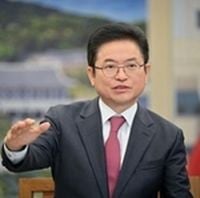
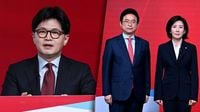
![[현장영상+] 국민의힘 1차 경선 토론 이틀째...나경원·이철우·한동훈·홍준표](https://thumbor.evrimagaci.org/lQp4Wa_m9bBpwUZIeWgcliSZdQs=/200x0/tpg%2Fsources%2F968c6129-4c71-4598-bf0c-2790f5d26060.jpeg)
